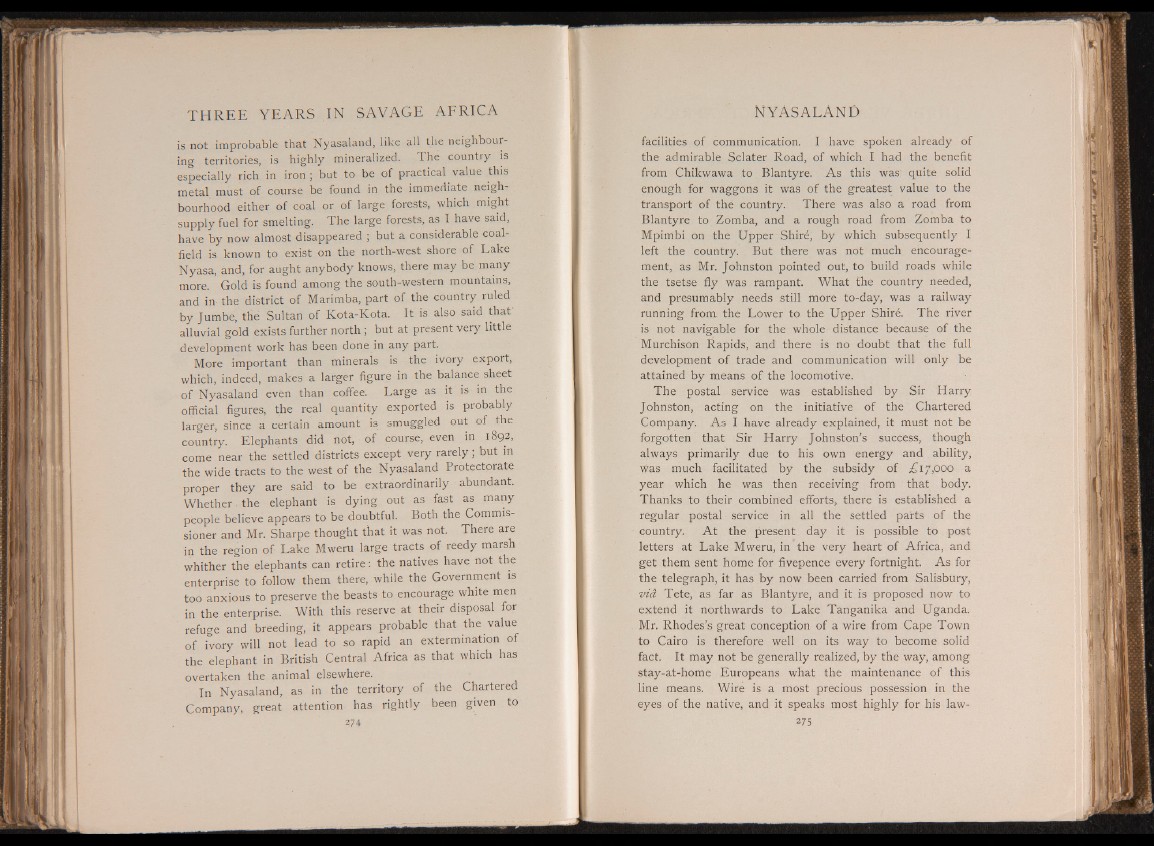
is not improbable that Nyasaland, like all the neighbouring
territories, is highly mineralized. The country is
especially rich in iron ; but to be of practical value this
metal must of course be found in the immediate neighbourhood
either of coal or of large forests, which might
supply fuel for smelting. The large forests, as I have said,
have by now almost disappeared ; but a considerable coalfield
is known to exist on the north-west shore of Lake
Nyasa, and, for aught anybody knows, there may be many
more. Gold is found among the south-western mountains,
and in the district of Marimba, part of the country ruled
by Jumbe, the Sultan of Kota-Kota. It is also said that
alluvial gold exists further north ; but at present very little
development work has been done in any part.
More important than minerals is the ivory export,
which, indeed, makes a larger figure in the balance sheet
of Nyasaland even than coffee. Large as it is in the
official figures, the real quantity exported is probably
larger, since a certain amount is smuggled out of the
country. Elephants did not, of course, even in 1892,
come near the settled districts except very rarely; but in
the wide tracts to the west of the Nyasaland Protectorate
proper they are said to be extraordinarily abundant.
Whether the elephant is dying out as fast as mapy
people believe appears to be doubtful. Both the Commissioner
and Mr. Sharpe thought that it was not. There are
in the region of Lake Mweru large tracts of reedy marsh
whither the elephants can retire: the natives have not the
enterprise to follow them there, while the Government is
too anxious to preserve the beasts to encourage white men
in the enterprise. With this reserve at their disposal for
refuge and breeding, it appears probable that the value
of ivory will not lead to so rapid an extermination of
the elephant in British Central Africa as that which has
overtaken the animal elsewhere.
In Nyasaland, as in the territory of the Chartered
Company, great attention has rightly been given to
274
facilities of communication. I have spoken already of
the admirable Sclater Road, of which I had the benefit
from Chikwawa to Blantyre. As this was quite solid
enough for waggons it was of the greatest value to the
transport of thé country. There was also a road from
Blantyre to Zomba, and a rough road from Zomba to
Mpimbi on the Upper Shiré, by which subsequently I
left the country. But there was not much encouragement,
as Mr. Johnston pointed out, to build roads while
the tsetse fly was rampant. What the country needed,
and presumably needs still more to-day, was a railway
running from, the Lower to the Upper Shiré. The river
is not navigable for the whole distance because of the
Murchison Rapids, and there is no doubt that the full
development of trade and communication will only be
attained by means of the locomotive.
The postal service was established by Sir Harry
Johnston, acting on the initiative of the Chartered
Company. As I have already explained, it must not be
forgotten that Sir Harry Johnston’s success, though
always primarily due to his own energy and ability,
was much facilitated by the subsidy of £17,000 a
year which he was then receiving from that body.
Thanks to their combined efforts, there is established a
regular postal service in all the settled parts of the
country. At the present day it is possible to post
letters at Lake Mweru, in the very heart of Africa, and
get them sent home for fivepence every fortnight. As for
the telegraph, it has by now been carried from Salisbury,
viâ Tete, as far as Blantyre, and it is proposed now to
extend it northwards to Lake Tanganika and Uganda.
Mr. Rhodes’s great conception of a wire from Cape Town
to Cairo is therefore well on its way to become solid
fact. It may not be generally realized, by the way, among
stay-at-home Europeans what the maintenance of this
line means. Wire is a most precious possession in the
eyes of the native, and it speaks most highly for his law